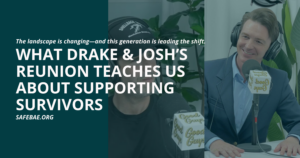What Drake & Josh’s Reunion Teaches Us About Supporting Survivors
The landscape is changing—and this generation is leading the shift.
A Conversation 20 Years in the Making
Last week, something happened that no one really expected—Drake Bell and Josh Peck sat down together for the first time in nearly two decades. It wasn’t for a reboot or a reunion special. It was a conversation—raw, real, and long overdue.
On an episode of Peck’s podcast Good Guys, the former Drake & Josh co-stars finally talked about everything that’s happened since their childhood fame—including Drake’s decision to publicly share, in the Quiet on Set documentary, that he was sexually abused by a Nickelodeon dialogue coach while he was a teenager working on the show.
For Josh, this was the first time he’d heard the full truth—and the weight of that landed hard.
“I just wish I had been there more for you. And I didn’t know how. I didn’t know what you were going through,” he told Drake. “But I believe you. And I’m sorry.”
Drake shared how painful it was to have to keep it to himself, even around people he considered close.
“I felt like I had to live this double life,” he said. “At work, I had to pretend everything was fine. But the truth was, my safe place—the set, the show—wasn’t safe at all. The worst part was, every day I got there, the monster was there.”
What made this moment so powerful wasn’t just the apology. It was the fact that two people who had shared the same space for years were finally able to talk about the reality of what was happening behind the scenes—and how much silence had cost them.
What Silence Costs—and Why This Generation Won’t Let That Continue
What makes Quiet on Set and the Drake & Josh conversation so important is that, for a long time, this kind of abuse wasn’t talked about—especially not when it involved “successful” people, childhood fame, or someone’s favorite show.
Drake said it himself:
“I felt like I couldn’t say anything. I thought I’d lose everything, or no one would believe me.”
That fear is real for so many survivors. It’s what keeps people quiet—not because they don’t want justice, but because the risk of not being believed or being blamed feels too big. And when the world keeps moving, acting like nothing happened, it only makes that silence feel heavier.
Josh’s reaction—his apology, his openness, his acknowledgment—was more than overdue. It was a reminder that believing survivors, even when it’s hard or uncomfortable, is powerful. It doesn’t fix what happened, but it shows that the responsibility was never theirs to carry alone.
For anyone watching who’s ever wondered why someone didn’t come forward sooner, this is the answer: they didn’t feel safe.
But here’s what feels different now: we’re watching the culture shift in real time. These conversations—the ones that were once whispered or avoided altogether—are finally happening out loud. Survivors are being heard. Abusers are being named. And people are starting to understand that silence protects no one.
That shift is happening because young people have stepped up and said: this isn’t good enough. You’re leading the way by asking for better education, safer environments, real accountability—and refusing to let this issue keep getting brushed aside. And because of that, everyone else is starting to follow.
Supporting Survivors Means Showing Up Now
It shouldn’t take a documentary for people to finally believe someone’s story. And it shouldn’t take 20 years for a survivor to hear the words “I’m sorry” from someone who mattered to them. But this moment between Drake and Josh reminds us of how much healing can happen when survivors are believed, supported, and given the space to speak without shame.
If you’re a survivor, know this: you never owe anyone your story. But when you choose to speak, you deserve to be met with respect, safety, and care. And if you’re someone listening to someone else’s story—your job is to listen, not to question.
At SafeBAE, we’ve spent years working to make sure these conversations don’t take decades. Through peer-led education, school-wide prevention, and survivor-centered support, we’re building a world where students learn what consent actually looks like, how to intervene, and how to be the kind of person someone feels safe opening up to.
If this conversation moved you, don’t just repost it—act on it.
– Bring SafeBAE to your school.
– Sign up for our peer educator training.
– Donate to support youth leadership in this work.
Visit safebae.org or reach out directly to info@safebae.org to get started.


